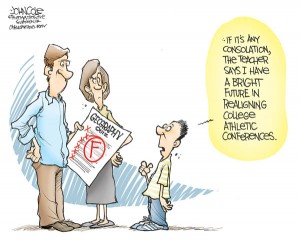Posted by rtmsf on September 23rd, 2011
There’s reason to believe that the Big 12 will survive for at least another year with the news Thursday that two of the conditions most desired by several of its remaining member institutions will come to fruition. Well, they hope, at least. The first condition, reportedly required by Oklahoma (but presumably other schools as well), was that Commissioner Dan Beebe be ousted from his position as a result of what is widely viewed as executive incompetence in the face of serious and repeated threats to the existence of the league. His mutually agreed-upon ‘resignation’ was accepted by the remaining schools Thursday night.

The conference’s board of directors conducted a wide-ranging teleconference Thursday on the future of the league as Big 12 commissioner Dan Beebe negotiated a “mutual agreement” with the league to leave his job immediately. Beebe will be replaced on an interim basis by former Big Eight commissioner Chuck Neinas, 79, one of the most widely respected insiders in college football.
Facing the destruction of his conference for the second time in 16 months, Beebe was the easy scapegoat here, but the bitter irony he must taste in retirement is that some of the very measures he attempted to institute — namely, better revenue sharing and stronger disincentives to leave — are now getting pushed by several remaining schools as absolute necessities to safeguard the future of the league. One of those remedial measures (and the second condition) involves locking schools into a long-term commitment to the conference by collectively agreeing to give up their ‘first-tier’ and ‘second-tier’ rights to televised broadcasts of their games for the next six years, otherwise known as a “grant of rights.” From the NYT:
Read the rest of this entry »
| rtc analysis
| Tagged: big 12, brady deaton, conference realignment, dan beebe, david boren, espn, missouri, oklahoma, texas
Share this story












































